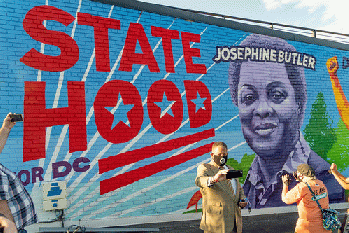An unprecedented galaxy of progressive leaders, experts, organizers, and activists convened for the inaugural edition of the National Justice Roundtable on August 30 via Zoom. More than 200 attended. Among the speakers were the legendary Dolores Huerta, co-founder, with Cesar Chavez, of the Farm Workers Union; Chase Iron Eyes, Attorney for the Lakota People's Law Project and leader of the Standing Rock protests; Mustafa Ali, vice president of the National Wildlife Federation and longtime leader of the EPA; Reverend Graylan Hagler, veteran activist and minister of the Plymouth Congregational United Church of Christ in DC; and Christian Nunes, president of the National Organization of Women. And the list goes on! A more complete summary can be found at https://grassrootsep.org.
The purpose of the roundtable is to galvanize progressives under one umbrella, combining talent and experience to most effectively bring about crucial existential changes before it is too late to, literally, change the world. Focal issues are DC statehood, voting rights, the environment, and poverty/homelessness.
Yesterday's event was the pilot of a series charted to continue bimonthly until Election 2024 if not thereafter.
The roundtable was originally meant to culminate a three-day live event in Washington, DC, commemorating the 58th anniversary of the March on Washington, where Martin Luther King Jr. delivered his I Have a Dream speech. The August 28 march on Washington, in which thousands participated (see click here), remained live though undoubtedly attended by fewer than expected because of the revival of the covid threat.
The march was dedicated to DC Statehood and voting rights.
Yesterday's roundtable was dedicated to the memory of the actor/activist Ed Asner, who passed away on August 29 and will be sorely missed by the communities with which he worked. The theme throughout must be the immortal words of Dolores Huerta, "Que si, se puede!"
A video of the entire four hours of yesterday's event can be found at electionprotection2024.org. The rest of this report will focus on DC statehood and election protection issues, the first two subjects of the Roundtable.
Under the deft and charismatic leadership of Joel Segal, co-founder of the Roundtable and senior legislative assistant to Rep. John Conyers from 2000 to 2013, and Harvey "Sluggo" Wasserman, author, academic, and activist and national coordinator of the National Grassroots Election Protection Coalition, the event's first specific focus after the keynote speeches was on DC Statehood. First to speak was DC's US Senator Michael Brown, duly elected but "not allowed to serve" because the District has not yet gained statehood. The best Congress can so far do for the population of 700,000 is to allow US Representative Eleanor Holmes Norton to vote at the committee level in the House.
The senator began with a brief history of the District, which was first in the country to free its slaves (and the "last jurisdiction to be free"): how it was deprived of representation and control of its budget"all of our rights." Today, though some rights have been grantedpassing laws and collecting taxes as well as " a mayor and city council, "no dollar can be spent if they [Congress] decide against it."
Subject to the highest per capita income taxes in the nation, serving in the armed forces, DC residents are truly "second-class citizens" whose license plates appropriately proclaim "taxation without representation."
Inevitably the District has fought back; Congress passed a constitutional amendment in 1970 to grant statehood and in 2009 Congress again voted in DC's favor to no avail.
(Note: You can view every article as one long page if you sign up as an Advocate Member, or higher).






